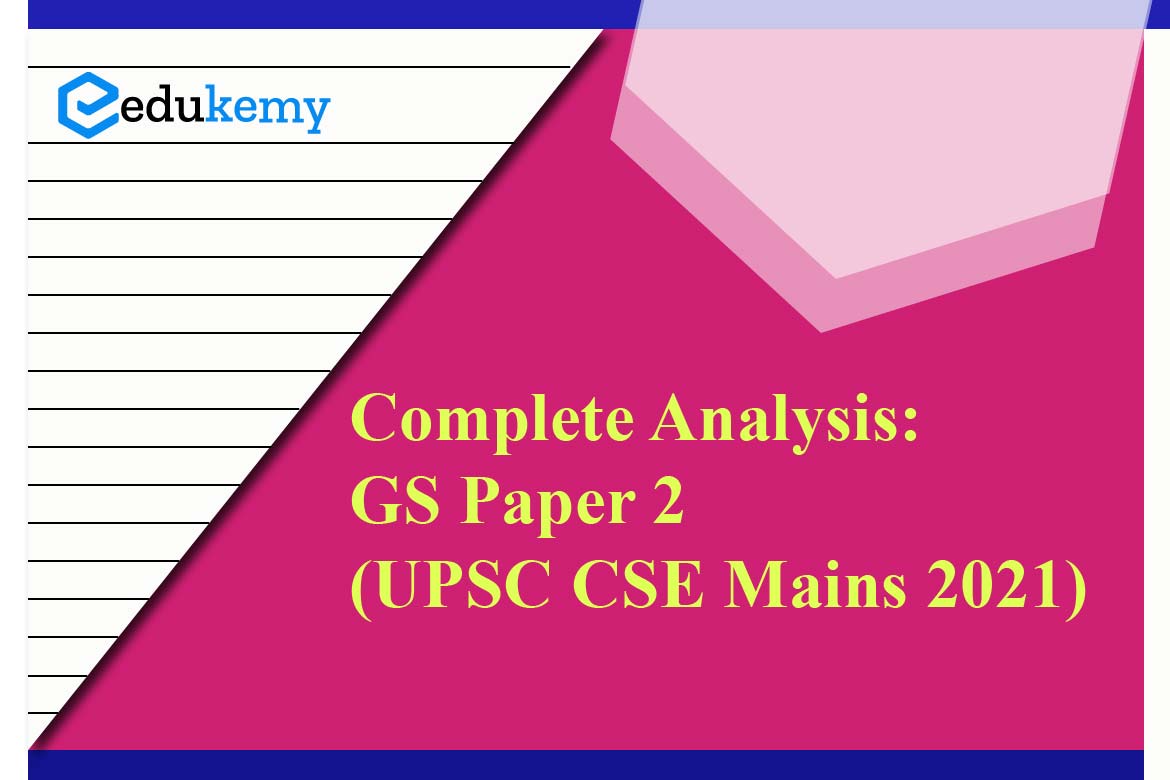The GS Paper 2 of UPSC Mains has questions from Polity, Governance, and International Relations. In CSE Mains 2021, there were overall twenty questions. Ten questions of 10 marks each and ten questions of 15 marks each were asked in the exam. All questions were compulsory, and candidates were to write answers with word limits of 100 and 150 respectively for 10-marks and 15-marks questions.
The overall paper was balanced, with questions from almost all the major sections of the syllabus. Certain questions saw the blending of various topics in the syllabus and had interlinking or social aspects related to the topic. This is a noticeable deviation from the UPSC exam pattern in recent years. Candidates should pay attention to this changing aspect of nature and prepare for any topic considering its various dimensions, impacts, and implications.
Click to See All the Questions: GS Paper 2 (UPSC CSE Mains 2021)
Contents
- 1 Analysis: Polity and Governance
- 2 Analysis: International Relations (GS 2)
- 3 Analysis of the level of difficulty, points need to be focused and the weightage trend
- 4 Trend and deviation from the past year
- 5 Frequently Asked Questions (FAQs)
- 5.1 FAQ: What is the significance of the Directive Principles of State Policy (DPSP) in the Indian Constitution?
- 5.2 FAQ: How does the Parliament of India ensure the independence of the judiciary?
- 5.3 FAQ: What is the role of the Election Commission of India in ensuring free and fair elections?
- 5.4 FAQ: How does federalism operate in India?
- 5.5 FAQ: What is the role of non-governmental organizations (NGOs) in social development?
- 6 In case you still have your doubts, contact us on 9811333901.
Analysis: Polity and Governance
- Categorization: The questions were divided into two categories, as usual, the former part (questions 1 – 10) was unidimensional and the latter part (questions 11 – 20) was multidimensional, however, their difficulty was spread across the paper notwithstanding the above categorization. In the latter part, the UPSC expressed some creativity in blending different parts of the syllabus into one question, this ups the game of preparation to a new level. (refer to questions numbered 2 and 11)
- Difficulty level: The difficulty level of the paper was moderate – on a scale of 6-7/10.
- Emphasis: The questions laid emphasis on conceptual clarity and were worded sharply, which implies that a generic reproduction of facts would mostly be beside the point in such a paper, the questions tested the ability of the student to read between the lines and were specific and pointed in their demand (refer to questions numbered 1, 2 and 3)
- Syllabus Coverage: The UPSC exploited the broad interpretation of the syllabus to introduce questions that may not generally form part of the resource material of an institute, but nothing can be claimed to be out of the syllabus. (Refer to questions numbered 1, 2, 5, and 13)
- Current Affairs Coverage: The questions extensively covered current affairs and incidences related to polity and governance either directly (questions numbered 6 and 7) or indirectly in questions where current affairs events inspired deeper conceptual thinking (questions numbered 11 and 15).
- A qualitative analysis: This is the kind of paper where a student may have a lot of material to write and may even be convinced that she’s made a decent attempt, but as the questions are read in detail, they reveal their layers of specific demands, and the feeling grows that reproduction of generic-material will not be of good service to a paper like this. These students may need to reorient themselves to study the subject with some depth and personal engagement and read current affairs with conceptual underpinnings.
Analysis: International Relations (GS 2)
Length of the “International Relations” Section in “GS Paper 2” 2021
- The international relations section had 4 questions (two 10 markers + two 15 markers).
- Total weightage: 50 marks (⅕ of GS 2)
Questions asked
- “If the last few decades were of Asia’s growth story, the next few are expected to be of Africa’s”. In the light of this statement, examine India’s influence on Africa in recent years (10 Marks)
- “USA is facing an existential threat from China that is much more challenging than the erstwhile Soviet Union”. Explain (10 marks)
- The new tri-nation partnership AUKUS is aimed at countering China’s ambitions in the Indo-Pacific region. Is it going to supersede the existing partnerships in the region? Discuss its strength and impact of AUKUS in the present scenario (15 marks)
- Critically examine the aims and objectives of SCO. What importance does it hold for India? (15 marks)
Analysis of the level of difficulty, points need to be focused and the weightage trend
- Questions were designed based on a provided statement and the examination of it
- “If the last few decades were of Asia’s growth story, the next few are expected to be of Africa’s”. In the light of this statement, examine India’s influence on Africa in recent years
- “USA is facing an existential threat from China that is much more challenging than the erstwhile Soviet Union”. Explain
- Some questions were difficult (in terms of analysis-based questions) like
- The USA is facing an existential threat from China that is much more challenging than the erstwhile Soviet Union. Explain
- However, Linkages to Directive words are a must to keep an eye on.
- Eg, an existential threat from China
- The growth story of Asia and Africa
- Critical examination of aims and objectives of SCO
- AUKUS _ China, Indo-Pacific region, supersede the existing partnership
- Also, current challenges that took place in the recent past become important to mention while writing an answer
- Role of SCO
- AUGUST
- Africa as an emerging region
- China vs the USA
- Indo Pacific etc
- Many predictable questions were there like:
- The new tri-nation partnership AUKUS is aimed at countering China’s ambitions in the Indo-Pacific region. Is it going to supersede the existing partnerships in the region? Discuss its strength and impact of AUKUS in the present scenario
Trend and deviation from the past year
| International Relations | GS MAINS PAPER 2 | 2013 | 2014 | 2015 | 2016 | 2017 | 2018 | 2019 | 2020 | 2021 |
| Neighbors | 50 | 12.5 | 25 | 12.5 | 10 | 0 | 0 | 0 | 0 | |
| Non-neighbors and Diaspora | 10 | 0 | 12.5 | 12.5 | 30 | 25 | 40 | 25 | 20 | |
| Institutions, groups, and agreements | 10 | 50 | 12.5 | 25 | 10 | 25 | 10 | 25 | 30 |
Our Hit Rate
More than 70% of questions in the GS Paper 1 were covered by Edukemy in its Daily Gazette, Weekly Kosmos, Mains Support Programmes (Hand Written Answers), and Mains Final Pages.
Click to see the question-wise mapping of various questions from our sources

Frequently Asked Questions (FAQs)
FAQ: What is the significance of the Directive Principles of State Policy (DPSP) in the Indian Constitution?
Answer: The Directive Principles of State Policy, outlined in Part IV of the Indian Constitution, provide guidelines to the state in policymaking. Although not enforceable in court, these principles are fundamental in shaping the socio-economic development of the country. They aim to establish a just and egalitarian society by promoting social and economic justice, equality, and the overall welfare of citizens.
FAQ: How does the Parliament of India ensure the independence of the judiciary?
Answer: The independence of the judiciary is maintained through various mechanisms. The Constitution provides for the separation of powers, ensuring that the judiciary is free from executive or legislative influence. The process of appointment and removal of judges involves a consultative process, and once appointed, judges have security of tenure, which means they cannot be easily removed. This insulation helps safeguard the judiciary’s independence.
FAQ: What is the role of the Election Commission of India in ensuring free and fair elections?
Answer: The Election Commission of India (ECI) plays a crucial role in conducting free and fair elections. It oversees the entire electoral process, from voter registration to the declaration of results. The ECI ensures a level playing field for all political parties, monitors election expenses, and takes measures to prevent electoral malpractices. Its autonomy and impartiality are vital for upholding the democratic principles of the Indian electoral system.
FAQ: How does federalism operate in India?
Answer: India follows a quasi-federal system where powers are divided between the central and state governments. The Constitution clearly delineates the powers of the Union and states in the Seventh Schedule. While some subjects are exclusively under the jurisdiction of the central government, others are the domain of the state governments. Concurrent subjects are shared responsibilities. The federal structure ensures a balance of power, promoting cooperative federalism for the overall development of the nation.
Answer: NGOs play a vital role in social development by complementing the efforts of the government. They often work at the grassroots level, addressing issues related to education, healthcare, environment, and human rights. NGOs act as intermediaries between the government and the community, facilitating the implementation of welfare programs. Their role in advocacy, awareness, and community engagement contributes significantly to achieving inclusive and sustainable development goals.
In case you still have your doubts, contact us on 9811333901.
For UPSC Prelims Resources, Click here
For Daily Updates and Study Material:
Join our Telegram Channel – Edukemy for IAS
- 1. Learn through Videos – here
- 2. Be Exam Ready by Practicing Daily MCQs – here
- 3. Daily Newsletter – Get all your Current Affairs Covered – here
- 4. Mains Answer Writing Practice – here


